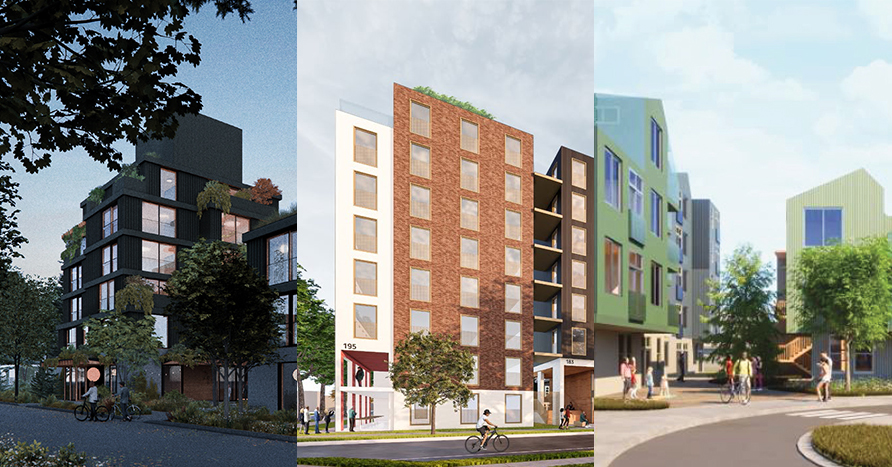Urbanarium is presenting a design competition to solicit ideas that explore solutions to the two most urgent challenges of today: housing affordability and climate change, at the upper range of Missing Middle density.
Housing affordability is an urgent challenge that is focusing the policy directions of municipal and senior governments on ways to increase housing supply. Major urban redevelopment projects promise to provide a substantial number of new units, primarily in the form of apartments, often in towers. Ways to increase housing opportunities in large areas of low and medium density residential zoning are also gaining momentum as a parallel policy approach. Planning policies are now calling for apartment forms, generally up to six stories to comply with wood-frame construction codes, to be permitted in low density zones.
As an alternative to condo towers, wood-frame (stick built or prefabricated) multifamily buildings in the six-storey range provide many benefits: simple, low- carbon construction, participation opportunities for smaller local developers and builders, less strong ties to global financial fluctuations, less excavation for underground parking, better contextual fit, and less shadowing/overlook. And yet, designers exploring apartment forms find that zoning, parking, and building code restrictions, combined with the financial and marketing factors to achieve affordability, generate buildings that struggle to offer access to outdoor space, family-oriented amenities, and other aspects of sociability. Cross-ventilation and access to sunlight are difficult to achieve within standard building footprints.
In urban areas, the challenge of housing affordability is undeniably significant. However, it is crucial to recognize that this issue cannot be viewed in isolation. Urban environments are facing a convergence of overlapping crises that demand our attention. Alongside housing affordability, we must address the urgent concerns of climate change, social isolation and mental health, and ecological decline - factors that normally are at odds with lowering construction costs. These challenges are interconnected, and the future of cities depends on tackling them simultaneously, while recognizing the intricate relationships between these crises.
Housing designs that prioritize efficiency alone can lead to uncomfortably tight units in buildings that lack shared spaces that promote neighbourliness and community. While other factors are also at play, the way our homes and neighbourhoods are designed can exacerbate feelings of isolation and result in decreased community ties and support systems.
Alternatively, new approaches to the way we design, or going back to ways we have done things in the past, can help to address these challenges and create living spaces that foster a sense of connection and well-being.
Co-housing and co-living arrangements, including multi-generational households and other formats that encourage sharing, are seeing renewed interest. Designers are rethinking housing typologies that focus on the nuclear family.
(From competition brief)
The Jury and the Planners Advisory Panel will have discretion in the award of prizes and will include in their consideration such factors as:
a. Design features and proposed code and regulatory proposals that contribute to low-end-of-market affordability as supported by the pro forma/business plan
b. Proposed changes to code requirements, including ones based on codes and regulations from other jurisdictions, that are intended to produce more affordable, sociable, and efficient housing
c. Potential to promote social engagement, access, and inclusivity among residents and with the neighbourhood
d. Relationship of units to shared semi-private or community outdoor space at grade and/or on structure
e. Innovative ways to both mitigate and adapt to climate change with appropriate, simple, and easily operated and maintained systems - for example, low energy, climate resilient approaches to comfort and livability
f. Practicality and potential impact of the ideas if implemented
(From competition brief)
(Consult the competitors' projects for specific comments from the jury)
| Jury | Frances Bula, Journaliste |
| | Richard Henriquez, Architecte |
| | Marta Maj, Ingénieure |
| | Sara Muir, Gestionnaire |
| | Inge Roecker |
| | Shirley Shen, Architecte |
| | Ly Tang, Responsable du développement |
| | Alfred Waugh, Architecte |
| | Cedric Yu |
| |
|
| |
|
| |
|
| Technical Commitee | Wilma Leung |
| | Neil Murray |
| | Ping Pang |
Early Bird Registration Opens: Wednesday, December 6th, 2023
Site Packages*: Thursday, December 14th, 2023
Deadline for Questions Round 1: Friday, December 15th, 2023
Early Bird Registration Deadline: Wednesday, December 20th, 2023
Answers Posted Round 1: Tuesday, December 19th, 2023
Deadline for Questions Round 2**: Friday, January 5th, 2024
Answers Posted Round 2: Tuesday, January 9th, 2024
Registration Deadline: Tuesday, January 16th, 2024
Submission Deadline: Wednesday, April 3rd, 2024
Jury Deliberation: Saturday, April 13th, 2024
Award Presentation: Tuesday, April 16th, 2024
Party! Publication & Solutions Video: June, 2024
*The first wave of site packages will be distributed on Thursday, December 14th, with
subsequent packages being distributed on an ongoing basis.
**Round 3 of Questions TBD.
(From competition brief)
Urbanarium announces winners of Decoding Density, Canadian Architect, 2024
Conner, Shawn, Winners of Urbanarium's design competition look past current building codes to increase density, livability, Vancouver Sun, 2024
Chai, Howard, BC-Based Urbanarium's "Decoding Density" Competition Drawing Global Attention, Storeys, 2024
Conner, Shawn, Winners of Urbanarium's design competition look past current building codes to increase density, livability, The Province, 2024
Bula, Frances, How to build a friendly building, The Globe and Mail, 2024
Mansour, Sara, Millennial architects redefine Canadian dream of homeownership, Spacing Vancouver, 2024
Harris, Michael, Can This 'Decoding Density' Architecture Competition Solve Vancouver's Housing Crisis?, Vancouver Magazine, 2024
- Programme
- Règlement
- Rapport du jury (global)
